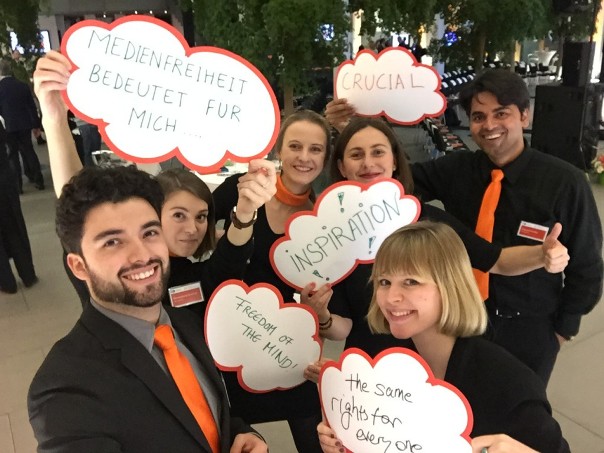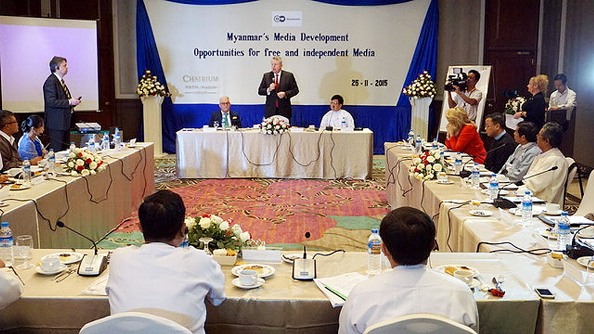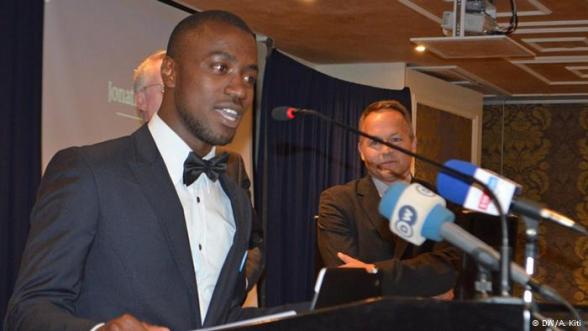Search Results for Tag: DW-AKADEMIE
DW has exciting opportunities for young journalists
The journalism traineeship from DW Akademie gives young journalists a unique chance to gain hands-on experience in professional media at Germany’s international broadcaster. DW’s paid traineeship covers a range of essential skills for modern journalists ranging from TV moderation and multimedia storytelling to data journalism and social media.
The application period, which begins on January 11 and closes February 29, is the first step of a challenging four-step process where applicants will showcase their talent and motivation. Selection is competitive and those who succeed can be assured that their fellow trainees share their drive and interest. Native speakers of English with good knowledge of German are especially encouraged to apply.
After an applicant is selected the traineeship begins in September. The 18-month program challenges perspectives and develops talent by combining practice with theory. Each trainee will spend time working with one of DW’s editorial departments writing and producing reports for radio, television and online.
DW trainees also participate in large-scale, international media projects. In 2015 the multimedia project “meine Oma, das Regime und ich,” won a CNN Journalist Award. The project was a collaborative effort from trainees who profiled their grandmothers’ experiences living under dictatorships. DW trainees also work in projects outside DW, like the SkillsXchange program, which was a group of young European journalists working on reporting the Prix Italia media awards.
Any further questions can be answered here.
Building a free press from the ground up in Myanmar
With the change in government in Myanmar, a new broadcasting act is to be put in place that will allow private television broadcasting for the first time in the history of the country.
It is a critical time for Myanmar, which had been ruled by military dictatorship from 1962 to 2011, and with former military leaders continuing to maintain power in parliament since that time. After a parliamentary election on November 8, the NLD party that supports liberal democratic values won a landslide majority vote and now has the mandate to govern.
The importance of a free media in developing liberal public institutions will make itself very apparent in the near future and the level of press freedom that will actually be allowed is something to monitor. Myanmar currently ranks 144th out of 180 nations on the Reporters Without Borders Press Freedom Index. Harassment and imprisonment of journalists was widespread in Myanmar as recently as 2014.
This is why institutions like DW Akademie can make a huge difference. As Germany’s largest media development organization, it has been deeply engaged in media development in Myanmar since 2012. With the changes in the past year, DW Akademie’s activites in Myanmar have been greatly expanded. In October 2015, DW Akademie worked in cooperation with the United Nations Development Programme (UNDP) and organized a series of workshops to introduce how community broadcasting works. Myanmar also elected a press council and DW Akademie representatives attended the ceremony. Earlier in 2015, DW Akdemie organized a training program for local journalism teachers that will help support the development of local media and promote a culture of quality media at its roots.
DW has also been a consistent trusted advisor to the state broadcaster MRTV and in 2014 helped found the Myanmar Journalism Institute, the first private journalism school in Myanmar. At a recent event, organized by DW Akademie in Yangon, DW’s Director General Peter Limbourg met with media representatives to discuss the opportunities and challenges of the transition.
There has also been criticism of a 2014 News Media Law in Myanmar from the free speech watchdog Article 19, with the safeguards for media freedom being,”heavily qualified and insufficient to meet international standards.” The media situation began to look better on paper, but according to Article 19, the laws often relied on imprecise legal language that doesn’t fully guarantee freedom of expression.
Besides the trappings of governance, there is also the issue of developing a confident and effective media culture in Myanmar, so that journalists know how to do their jobs and take advantage of their potential new freedoms.
Though the transition into a free media market will be a bumpy ride for broadcasters and other media operators in Myanmar, an essential aspect of quality journalism begins from the ground up. If journalists posses skills and resources, combined with freedom to report and produce stories that have a positive effect on the social development of Myanmar, the business side of the problem could have less of an adverse impact. If the new government continues a legacy of bureaucratic and back-door control of the media, it will say a lot about where the country is heading.
It all started in Rwanda…
This year, DW Akademie is celebrating its 50th anniversary. It’s an institution that has grown immensely since that first training program for radio technicians in Rwanda. It has steadily expanded its work promoting press freedom, freedom of expression and media development. But the game has changed over the past five decades. Information can now reach every corner of the world, which is why media development has taken center stage in development policy. DW Akademiie is meeting these challenges with an innovative and interdisciplinary approach. They work on political frameworks in consultation with government authorities and NGOs, for example, and advise journalists and the media on developing new business models to assure their financial independence. Today, DW Akademie works in 50 countries around the world, with sustainably designed programs and clearly defined aims.
DW adds a new dimension to cooperating with African media
Across Africa from Kenya to Nigeria, a new media-savvy generation is emerging along with a new demand for opportunity, development and quality journalism. By reaching out to individuals, creating new partnerships and actively encouraging media development, DW has created a foundation for success in different African markets, while at the same time giving value back.
By adding value to partnerships and cooperating with local media in different regions, DW can help improve people’s lives with information and help set examples of transparency, legitimacy and professionalism in media.
DW’s international media development organization, DW Akademie, is very active in Africa and has been for over 50 years. DW Akademie’s first international project was a radio training program in Rwanda. Their newest initiative is a recently-signed partnership with Aga Khan University Graduate School of Media and Communications (AKU-GSMC) in Nairobi, Kenya.
The university is focused on developing media professionals for the Kenyan media market. DW is there to help guide and educate them with world-class standards of journalistic practice. In return, DW will gain valuable insight into the nuances of the local media landscape. The six-year agreement centers on the development of professional education and training standards for communications experts in East Africa. Through exchanging experience, competences and ideas, both sides will benefit. DW gains visibilty in an important media market and the courses at AKU-GSMC can improve and develop with the expertise and experience provided by DW Akademie.
Kenya is one of the quickest growing media markets in Africa and there is a burgeoning interest in media education amongst young Kenyans. The market is growing more competitive and innovative.
DW recently produced a journalism competition for young journalists in Kenya. They were asked to create a journalism project that profiled a local hero in their region. Local heroes are people who make a difference in their communities and help those around them. The competition was organized in cooperation with The Standard Group, which is the largest media company in Kenya. The competition showed how through cooperating with partners, DW can affect the lives of people in African target audiences while gaining valuable partners and a positive local image.
Nigeria is another important market for DW in Africa. DW has been expanding its presence in the region after adding two foreign correspondents last year in Lagos and recently signing a deal with Channels TV, the largest news broadcaster in Nigeria. The deal includes direct DW reports from the Frankfurt Stock Exchange produced exclusively for audiences in Nigeria. This example of coproducing and sharing technical capacity is a model for the future of how DW will provide international quality journalism to local audiences.
Programs like Focus on Africa and Crossroads Generation emphasize individuals who help to set examples and serve as role models. They provide examples that turn away from the image of the continent as only being beset by turmoil and focus on positive actions from a younger generation.
DW will succeed in African markets by working with partners, reaching people where they are, educating media professionals and promoting journalism education. These are all very positive steps with the consistent goal to improve the overall media landscape in African countries.
Market roundup: July 2015
Asia
DW’s new global English news channel is now available in Afghanistan via satellite after a three-year contract was closed with the satellite provider Afghanistan Broadcasting System. The satellite Afghansat 1 is operated by Eutelsat and will carry 60 international and national channels to a potential 1,5 million subscribers.
DW has a new broadcasting partner in Indonesia. The nationwide television provider Sky LBS will now carry the full program from DW’s new English news channel via cable, satellite and IPTV. Sky LBS can reach a potential 35.8 million households and has 123 national and international channels in its portfolio.
DW Akademie has opened a new office in Yangon, Myanmar in partnership with the German Federal Ministry for Economic Cooperation and Development (BMZ). The primary activities of DW Akademie in Myanmar are supporting the transformation of the state broadcaster MRTV and the construction and development of the first private journalism school in Myanmar, Myanmar Journalism Institute. DW Akademie has been active in Myanmar since 2009.
Europe
DW has partnered with the German UNESCO commission and the German Federal Foreign Office for a conference being held this month in Bonn. The highlight of the conference will choosing a new UNESCO World Heritage Site. For the occasion, DW produced a multimedia website Wege zum Welterbe that traces a virtual path across all World Heritage Sites in Germany.
Africa
DW and Nigerian broadcaster Channels Television have signed an extensive cooperation agreement.
The new partnership will feature live broadcasts with a DW market reporter from the Frankfurt Stock Exchange and four weekly interviews with DW correspondents covering current German and European issues in society and politics. Channels Television has the widest broadcasting range in Nigeria.












Feedback